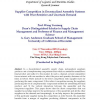Free Online Productivity Tools
i2Speak
i2Symbol
i2OCR
iTex2Img
iWeb2Print
iWeb2Shot
i2Type
iPdf2Split
iPdf2Merge
i2Bopomofo
i2Arabic
i2Style
i2Image
i2PDF
iLatex2Rtf
Sci2ools
MSOM
2010
2010
Supplier Competition in Decentralized Assembly Systems with Price-Sensitive and Uncertain Demand
: In a decentralized assembly supply chain, independent suppliers produce a set of complementary components from which an assembler assembles a final product and sells it to the market. In such a channel, several competitive forces interact with one another to affect the price and quantity decisions of the firms involved. These include 1) the direct competition each supplier faces for producing the same component, 2) the indirect competition among the suppliers producing the set of complementary components needed for assembling the final product, and 3) the vertical interaction between the assembler and the component suppliers. This paper shows that the direct competition that one supplier faces helps improve the performance of the assembler and all the other suppliers in the channel; and surprisingly, it can help improve the performance of this particular supplier facing the competition as well. Second, the assembler benefits from a merger of suppliers producing different components i...
| Added | 29 Jan 2011 |
| Updated | 29 Jan 2011 |
| Type | Journal |
| Year | 2010 |
| Where | MSOM |
| Authors | Li Jiang, Yunzeng Wang |
Comments (0)

